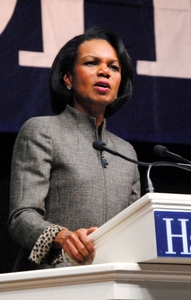Condoleezza Rice talks politics, education while students challenge Great Name status
by Emily Gerston '11
NEWS EDITOR
Condoleezza Rice has been called many things, but “victim” and “pushover” are not among those things, as she made clear during her visit to Hamilton last Monday. Dr. Rice gave the Hamilton community an insider’s view of her work as National Security Advisor and Secretary of State when she addressed a small group of students from government classes, held a meet-and-greet with students and lectured to the community as a part of the Sacerdote Great Names Series. Even though Rice was faced with protesters outside her lecture and provocative questions during the question-and-answer session held after her speech, Rice stood her ground and provided insight on questions of American politics, foreign policy and international relations from both her time in office and the present.
a meet-and-greet with students and lectured to the community as a part of the Sacerdote Great Names Series. Even though Rice was faced with protesters outside her lecture and provocative questions during the question-and-answer session held after her speech, Rice stood her ground and provided insight on questions of American politics, foreign policy and international relations from both her time in office and the present.
“I’m trying to remind myself every day, and still trying to remind myself, that today’s headlines and history’s judgment are rarely the same,” said Rice during her lecture.
Today, she is a politician and professor respected for her knowledge in her field, but also a contentious political figure. “We know what she stands for, her policy and what she’s done. And she has authorized torture … this is documented. And other countries consider her a war criminal,” said Sushmita Preetha ’11, who was protesting Rice’s appearance outside of the Margaret Scott Bundy Field House before the lecture. “What does that really mean, that we invited a person who has such questionable politics, and morals? I think that’s something to be upset about, and to be angry about.”
Will Gowen ’11 said, “People have said that the Great Names speakers have been too to the left, and now we’re bringing someone from the right. There are a lot of people from the right who aren’t war criminals who we should have brought here.” Although he protested Rice’s invitation to campus as a part of the Great Names Series, Gowen’s intention was not to dissuade people from hearing her speak. “We’re not stating for this protest to not go see her speak. I might go see her speak … there’s no reason why not to. But – we are calling her a Great Name, and I think that should be a continued discussion, and I do not agree with it.”
Despite the protestors outside of the Field House, Rice endeared herself to much of the Hamilton community when she said, “I can say with a full voice in this room something I can say across the country: I’m one who believes Thomas Jefferson was a somewhat overrated Founding Father. I’m an Alexander Hamilton fan!” That comment earned her a robust round of applause.
Then again, so did a critical question submitted by Professor of English Onno Oerlemans, who asked about Rice’s role America’s decision to go to war with Iraq. Oerlemans’ question was the first direct and pointed question about Rice’s actions in office, and as a very early question on the list, set the tone for the rest of the question-and-answer session, moderated by Associate Professor of Government Robert Martin.
“Yes, there were no stockpiles [of weapons of mass destruction]. Infrastructure, yes. Stockpiles, no,” responded Rice, adding that Iraq may have been as little as one year away from having weapons of mass destruction. Although she defended her actions, she conceded, “I would certainly do things differently in what we called ‘Phase 4,’” the stabilization and reconstruction phase of the war.
Rice also answered questions on topics ranging from the legality of waterboarding to Israeli-Palestinian relations to immigration to growing up in Birmingham, Ala., during the civil rights era. Rice, who is currently a professor of political science at Stanford University, a professor of political economy at the Stanford Graduate School of Business and the Thomas and Barbara Stephenson Senior Fellow on Public Policy at the Hoover Institution, said that as much as she valued the experience of being Secretary of State, she takes pleasure in her “normal” life now. “I especially enjoy getting up in the morning, reading the newspaper and thinking, ‘Oh, isn’t that interesting?’ and then realizing that … I can go read the sports page!” she joked.
Before her lecture to the community, Dr. Rice addressed students from Visiting Professor Maj. John Dehn’s Seminar in War Powers Class and Professor Alan Cafruny’s international relations classes. In the half-hour discussion session, she addressed both international and domestic topics, including the War on Terror, the military budget, and China’s role in global economics and policy.
Although Rice’s discussion with students only covered policy, she imparted college and life advice upon Hamilton students in her general lecture. As a student, Rice gave up her dream of being a concert pianist and eventually realized her passion for international politics after taking a class with Josef Korbel, Madeleine Albright’s father and professor of international politics at the University of Denver – a passion which has not left her since. “First and foremost, I hope you use the time [at college] to find your passion,” she advised. “And if you’re not careful, your passion will find you.”
